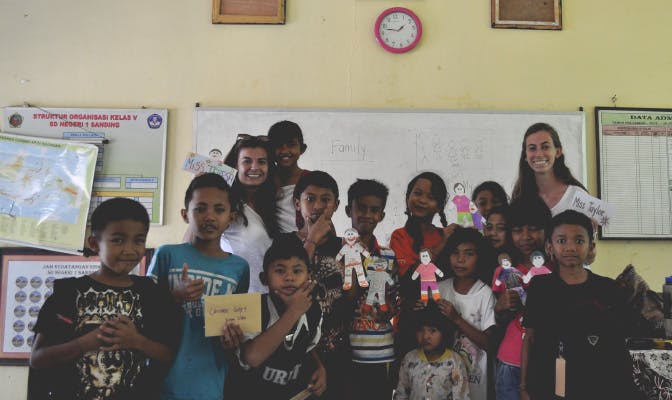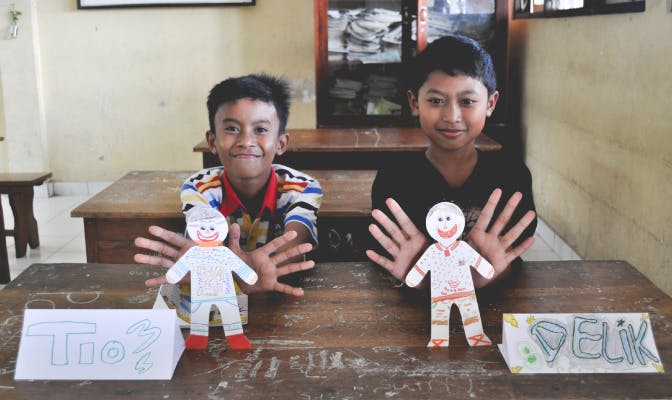
IVHQ’s Teach and Volunteer Abroad Scholarship recipient, Taylor Franks, is documenting her journey as a volunteer teacher in Bali. This week she shares her experience in the classroom and her tips to help future volunteers make the most of their time teaching English abroad.
IVHQ offers teaching projects in over 40 locations. Access to education and the opportunity to study English are highly valued in the communities we work with, as a result the work that international teaching volunteers have is meaningful and the impact goes well beyond the classroom. Also, read IVHQ’s teaching resources to help make the most of your time abroad.
I found myself sitting in the back of a car, nervously clutching my backpack of teaching supplies through the winding roads of Ubud. As I gazed outside my window, I noticed the brilliant green of the ongoing rice fields highlighted by the tumbling white clouds and blue sky. I had no idea how far the school was or what my class was going to be like, but regardless I was ready for my first day of in front of the classroom as a volunteer on the Bali Teaching English Project.
As a special education teacher in the United States, I was anxious to see how my classroom in Bali would compare to my classroom back home. I was used to a fast-paced classroom, brightly hung posters, and a crammed room overflowing with an abundance of supplies. I knew I would not have the commodities that my previous classes had held; however, I understood the basis of education is essentially universal, and my objectives and reasoning for teaching would remain the same.
Before departing for Bali, I took the online TEFL course through CCELT to gain an insight into teaching English as a foreign language. Through this program I learned plenty of examples of activities and games, and made plans to modify these activities with minimal resources. In addition, I packed markers, crayons, pencils, and other small classroom materials to ensure that my students and I would have the necessary materials to complete handmade activities.
As the car slowed down in front of the school, I was shaken from my wandering thoughts as my eyes settled from the horizon to my school. My fellow teachers and I clambered out, instantly greeted by dozens of loud, excited, and eager students. They circled us and waved before sprinting into their classrooms. It took us all a bit to figure out which classrooms we were supposed to teach in, and after wishing each other good luck, went into our respective rooms. I was meet again with smiles and warm greetings as my students sat at their wooden desks, waiting for my co-teacher and me to begin.
If any word is used to describe the students in the schools in Bali, it is certainly energetic. From the moment we arrive at school until we are waving goodbye and exchanging “see you tomorrow,” the students are lively. They are eager to learn, crave opportunities to socialize and play, and are spirited. Although this can be overwhelming, given the low levels of English proficiency that many students currently have, it should not be something that is pushed aside. Knowing the jubilance that the students hold adds advantages to the classroom in a way that encourages a collaborative and dynamic learning environment. The students are loud and love to talk, and positively reinforcing their triumphs and attempts to use the English language should be celebrated as much as possible.
Tips for volunteers heading to a Balinese classroom…
- Keep in mind classes change daily - the number of students, the ceremonies in the villages, and the time of year can all affect that makeup of your classroom.
- Have a loose timeline of what we hope to cover that week, but make decisions for the next day following your classes.
- The ages of your students can vary. Be fully prepared with activities for all ages (simple coloring pages for the young ones, more complex worksheets for the older students). In my third grade class, I have students ranging in age from 3 to 12, and can have anywhere from 6 to 20 students on a given day.
- Always bring more work than you think you will need.
- Be prepared for varying levels of English proficiency.
- Get to know the students first and then adjust your lesson plans accordingly.
- Students absolutely love games and jump at any chance to socialize with their peers.
- In addition, they love showing what English they have already learned.
- I have found that the students really connect with kinesthetic and musical learning- learning by movement, song, and dance. Bringing in or creating any small song or rhyme seems to help with learning basic vocabulary and phrases, and allows the students to consistently use the learned language without putting them on the spot. It can be an easy way to revisit and review the previous lessons to reinforce vocabulary before moving on to new material.
- Games like Bingo, Memory, and Simon Says are usually familiar with the students and are quick and effective activities for the students.
- It can be very difficult to explain rules, so keeping the games and directions simple is key for success.
Make the most of your time teaching in Bali…
While their vivaciousness adds to the classroom, it can be a bit overwhelming as a volunteer. It is difficult to come into a classroom of students, all whom share and speak the same language that is so different from English. It can be challenging to create a classroom of controlled chaos, one that includes the fun activities that all classrooms should, with set rules and expectations. I have found the best way to find the balance is to take some time to understand this unique perspective. For us volunteers, it is extremely challenging to remember and correct repeat phrases in the language of the country in which we are teaching. When we are leading our classrooms abroad, it is important to remember we are students as well.
I feel that it is very important to show the students that you are a learner of their language. Knowing simple conversational phrases like “hello,” “how are you?” “thank you,” “you’re welcome,” etc. not only help in daily life in town, but also help you to become more connected with the community. As a teacher, using phrases to gain proper classroom management are very helpful to change in between activities while the lesson is running. During orientation, we had several language lessons to help us learn these necessary phrases before entering the classroom. Additionally, coordinators from the program are around before, during, and after lessons if more help is needed.
Picking up these phrases also demonstrates to our students the importance that continued learning holds. We as adult volunteers are just as much students as the ones in our classroom. Having this shared experience can help to win the respect of the students we spend our time with daily.
The opportunity to teach English abroad is equally rewarding as it is challenging. It is important to be flexible, creative, and encouraging. The number of students, the levels, and ages of the students all vary day to day, as does the level of English proficiency of the students. As changing as this is, it is easily combated with preparedness and adjustability. It is helpful to keep the students constantly occupied and challenged, creating extensions for the students who fly through the new content and more scaffolds for the younger and newer learners. Those who are eager to share and talk with their peers can become teachers themselves, aiding the students around them. With patience, constant smiles, and praises, the school days come to a close, and soon the children are all sprinting away after thanking you for the lesson. Teaching abroad is exhausting, exhilarating, and simultaneously rewarding. It is a privilege to be accepted in a community far from your own, and to share your passions with those around you.
If you are ready to pack your bags and experience teaching in a classroom abroad in real life then you can find out more about volunteering with IVHQ in Bali here, or one of the other IVHQ teaching projects abroad.






